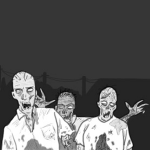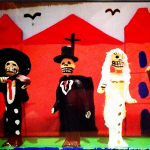FP380 – Coffin: The Drop of the Shoe, Part 4 of 4
Welcome to Flash Pulp, episode three hundred and eighty.
Tonight we present Coffin: The Drop of the Shoe, Part 4 of 4
[audio:http://traffic.libsyn.com/skinner/FlashPulp380.mp3]Download MP3
(Part 1 – Part 2 – Part 3 – Part 4)
(RSS / iTunes)
This week’s episodes are brought to you by The Skinner Co. Store
Flash Pulp is an experiment in broadcasting fresh pulp stories in the modern age – three to ten minutes of fiction brought to you Monday, Wednesday and Friday evenings.
Tonight, Will Coffin, urban shaman, and Bunny, his apprentice, find their lives threatened outside a downtown eatery.
Coffin: The Drop of the Shoe, Part 4 of 4
Written by J.R.D. Skinner
Art and Narration by Opopanax
and Audio produced by Jessica May
Bunny had been left with the ambulance.
“Wait in the ####ing car?” she was saying to keep herself company, “like I’m a ###damn brat sitting in the back of a wood-paneled station wagon or some ####.”
Unreadable behind his surgical mask, her toothy chauffeur said nothing.
* * *
Coffin hadn’t stood upon his balcony in some time.
“I’ve been busy,” he was explaining to his wife, but it did little to slow the dead woman’s ascent, finger hold by finger hold, up the side of the building.
She was already at the fifth floor, and he was left wondering if she’d been so fast the last time.
No, definitely not.
“Yeah, I heard,” she replied, “busy running around the country while everything fell apart.”
Realizing small talk was only going to get him murdered, Will cut to the chase, saying, “They killed Pisky.”
It was enough to stop her left hand in the middle of its ascent.
“Shit,” replied Sandy.
Such a pause was rare, and he relished the seconds. It was as close to mercy as she ever gave him.
“So far it’s us and them that know,” he said. “Won’t be long before the succession talk starts though, then the news’ll be out.”
Even a dozen floors down, he could see the twitch of her bloody palms. Every moment the apparition was away from her place of shattered resting was a struggle, and he knew she’d always found it easier to move forward than stay still. His hunger to make the occasion linger drew more honesty from his mouth than he’d intended.
 “Listen,” said Will, “there are also some spooks missing. I don’t think they’ve moved on, they seem to be just – gone.”
“Listen,” said Will, “there are also some spooks missing. I don’t think they’ve moved on, they seem to be just – gone.”
“Gone?”
He’d been watching Sandy’s eyes as he’d told her, and he could see her brain working through the equation.
The squint that meant she realized she was in danger.
The lift of her brow as she realized the consequences.
The frown she wore when she thought he was about to do something stupid.
Suddenly she was climbing again, her ethereal fingers leaving behind flesh and nail at every handhold.
“Don’t go in there,” she told him, and that was it, he knew the conversation was over.
Stepping back, he slid the glass door shut, flicked the lock, then blocked out his view of the balcony by pulling the rarely used thick brown curtains across the usual gauze of white.
Moving to the kitchen he opened the poorly masked fuse box and eyed the breakers within, then his practiced thumb sent the apartment into darkness.
In truth it was the only way to turn off the hallway light, though Bunny had never noticed there was no switch.
* * *
Coffin thought the word needed to get around and there was no one with more time for conversation than The Insomniac.
A single text had pushed the unsleeping man to return to Spinerette’s. He’d had twenty floating on a game of Shooter, but he hadn’t waited around to learn how things shook out. Obligations were obligations.
Still, he knew better than to stand in the open.
A dumpster and some fumbling had given him access to the roof of the florist’s shop across the road, and he’d watched their approach from the space between the painted yellow flowers that identified the store on its sign.
In the fifteen minutes he’d been waiting just a single car had passed, and even that had stopped and disgorged a trio of passengers into the still-closed restaurant.
The group had all been dressed alike, in bulky white hoods and white painter’s masks over their mouths.
Their clothing had made it difficult to identify any of them, but their heavy arms and broad shoulders made it clear they weren’t there to apply for wait staff positions.
Bunny and Coffin drifted in from the west, probably from a bus stop blocks away.
With no attempt at stealth, Will walked the exterior of the brick structure. As he moved he seemed to be leaving a finger trailing along the structure’s mortar and winter-barren trestles.
The city existed somewhere in the distance, but to The Insomniac nothing seemed alive on that street but the three shadows dancing across the interior windows and the pair of mystics facing them from the sidewalk.
Inches from where he started, and thus from completing his circuit, Coffin shouted, “it’s a requirement of my office to give you an opportunity to surrender. Will you renounce Kar’Wick and his web or can I get on with making you an example?”
It was then that the rooftop witness realized that it was not the shaman’s finger marking the route but a small stone that left a faint but glowing red line along its path.
“Come on inside so we don’t have to kill you in the street,” came the reply from a second floor window.
Will’s hand twitched, closing his loop.
For a second there was naught but the arcane in the space which had once held Spinerette’s. The cutlery abandoned in its sinks were no more, the tables were no longer covered in unblemished white plates and carefully folded napkins, there was not even any longer a trio of wide necked twenty-somethings with pistols in the bands of their crisp white jogging pants.
There was only blood, thick and red, holding the shape where chairs and potted plants and floor boards and bricks had once stood, then physics took its brutal hold and the sidewalk gutters ran red.
The declaration of war did not entirely satisfy the Coffin’s taste for justice, but he considered it a good start.
Flash Pulp is presented by http://skinner.fm, and is released under the Creative Commons Attribution-Noncommercial 3.0 Unported License.
Intro and outro work provided by Jay Langejans of The New Fiction Writers podcast.
Freesound.org credits:
Text and audio commentaries can be sent to comments@flashpulp.com – but be aware that it may appear in the FlashCast.
– and thanks to you, for reading. If you enjoyed the story, tell your friends.
 The courtroom’s air conditioning was running at a blast that had the smattering of retirees in the gallery whispering complaints about frostbite, but the private investigator considered the inside of his black wool suit an oven. Smith had hated formal wear since his mother had first forced him into a double-breasted vest for his sixth grade Christmas pageant.
The courtroom’s air conditioning was running at a blast that had the smattering of retirees in the gallery whispering complaints about frostbite, but the private investigator considered the inside of his black wool suit an oven. Smith had hated formal wear since his mother had first forced him into a double-breasted vest for his sixth grade Christmas pageant. “You’re looking for Mrs. Carver?” she asked. “I used to say good morning to her everyday.”
“You’re looking for Mrs. Carver?” she asked. “I used to say good morning to her everyday.” After he’d run through the houses that flanked the Dougherty home, and the single set of parents who used her day care services, Smith knew that the woman had seemed kind but distant, loved children, and was very forgiving about being paid late. They had little else to offer but questions and conjecture.
After he’d run through the houses that flanked the Dougherty home, and the single set of parents who used her day care services, Smith knew that the woman had seemed kind but distant, loved children, and was very forgiving about being paid late. They had little else to offer but questions and conjecture. In the following months his Pa found it increasingly convenient to allow the boy access to his fascination instead of laying aside pennies as compensation for the youth’s efforts on the homestead. It was soon the case that, despite dusty wind, or sweltering heat, or even impending storm clouds, William could be found in the shooting gallery of his mind.
In the following months his Pa found it increasingly convenient to allow the boy access to his fascination instead of laying aside pennies as compensation for the youth’s efforts on the homestead. It was soon the case that, despite dusty wind, or sweltering heat, or even impending storm clouds, William could be found in the shooting gallery of his mind. “I’m of the old school,” Mrs. Hemming, her current prospective-customer, was saying through a thin-lipped mouth, “but it strikes me that a girl your age shouldn’t be out running around by herself.”
“I’m of the old school,” Mrs. Hemming, her current prospective-customer, was saying through a thin-lipped mouth, “but it strikes me that a girl your age shouldn’t be out running around by herself.”
 Worse, the counter jockey had shown some doubt as to the intruder having a gun when he’d first been threatened, so, as proof, the thief had pulled out a compact black pistol and pointed it Derrick’s Mom.
Worse, the counter jockey had shown some doubt as to the intruder having a gun when he’d first been threatened, so, as proof, the thief had pulled out a compact black pistol and pointed it Derrick’s Mom. To the left of the bench-row of plastic chairs he was watching a couple of twenty-somethings fretting their way through paperwork while their infant daughter wailed from inside her bright pink car seat. Her mother was rifling a thick purse as the father used his non-writing hand to ineffectually rock the bassinet by its carrying arm.
To the left of the bench-row of plastic chairs he was watching a couple of twenty-somethings fretting their way through paperwork while their infant daughter wailed from inside her bright pink car seat. Her mother was rifling a thick purse as the father used his non-writing hand to ineffectually rock the bassinet by its carrying arm. Fourteen hours later Coffin and his tipsy companion were far to the north. Will had not bothered to introduce the farmer by name – he knew his former client preferred the distance. Still, the buzz-cut man had not said no to the shaman’s hurried request.
Fourteen hours later Coffin and his tipsy companion were far to the north. Will had not bothered to introduce the farmer by name – he knew his former client preferred the distance. Still, the buzz-cut man had not said no to the shaman’s hurried request.